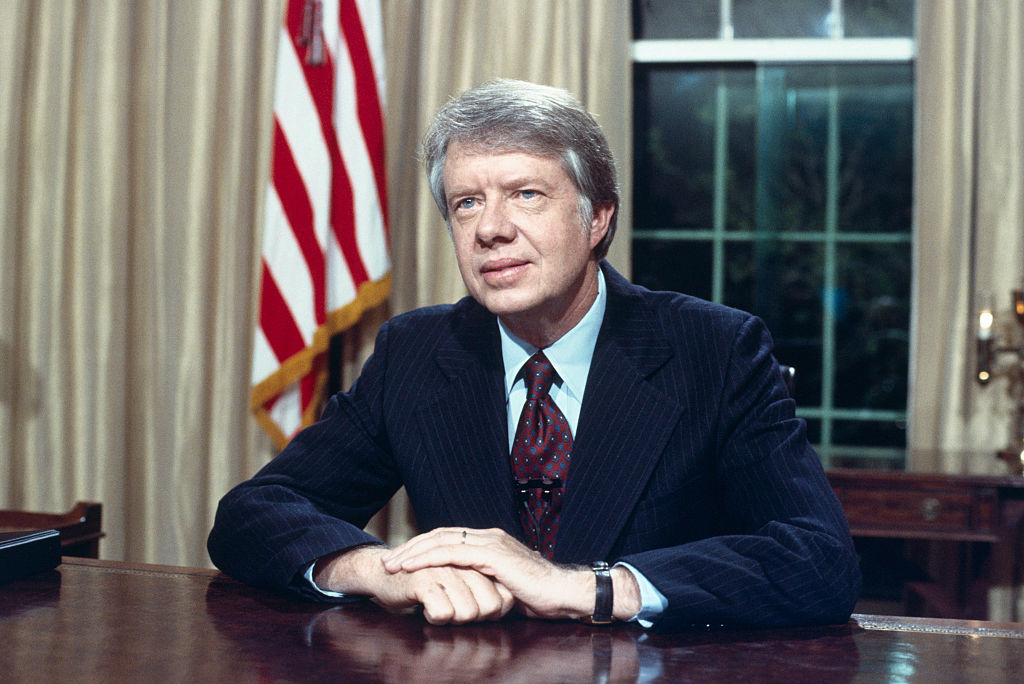In the wake of Jimmy Carter’s death at the age of 100, Joe Biden said that Donald Trump could learn “decency” from his fellow ex-president. It’s a politically expedient suggestion, positioning the President-elect as the anti-Carter just weeks before he returns to office. But before Trump concerns himself with matters of decency, there are more practical lessons to be gleaned from Carter’s eventful single term.
The surface-level contrasts between the peanut farmer and the real estate mogul are almost too obvious to mention. Carter taught Sunday school; Trump’s religious convictions have always seemed surface-level at best. Carter lived modestly in a Georgia ranch house; Trump inhabits an estate on a golf course and a gilded tower bearing his name. Yet both men stormed Washington as consummate outsiders, channeling voter frustration with the political establishment into unlikely victories — Carter exploiting post-Watergate disillusionment in 1976, Trump riding anti-elite sentiment 40 years later.
Their outsider status wasn’t just campaign positioning: it defined their presidencies in ways that highlight the perils and possibilities awaiting Trump’s second term. Carter arrived in Washington determined to drain the swamp before that phrase entered the political lexicon, refusing to play by the capital’s traditional rules. He often snubbed and verbally sparred with members of Congress rather than cultivating them as allies, and even publicly admitted to making enemies in both parties. Sound familiar?
Yet Carter’s presidency also demonstrates how an outsider can achieve lasting reform by identifying opportunities for bipartisan structural change. His most consequential domestic achievement wasn’t any of his headline initiatives, but instead airline deregulation, which fundamentally transformed the industry by allowing market forces to determine routes and fares. Though remembered as a progressive, Carter proved remarkably willing to embrace free-market solutions, also deregulating trucking, telecommunications, freight rail, and even beer production.
Trump could find similar opportunities for bipartisan structural reform during his second term, particularly in dismantling aspects of the administrative state. The Department of Education, which Carter created out of an existing department in the interest of efficiency, presents an obvious target. Just as Carter consolidated scattered education functions into a new department, Trump could work to fold the still-useful parts back into Health and Human Services — a move that would appeal to conservatives while potentially streamlining bureaucracy in ways progressives might support.
The Middle East offers another arena in which Carter’s example proves instructive. His patient shuttle diplomacy produced the Camp David Accords between Israel and Egypt, a landmark achievement that required engaging with difficult leaders and making painful compromises. Trump, who has already brokered the Abraham Accords normalising relations between Israel and several Arab states, could look to Carter’s painstaking process as a model for expanding regional peace. This would complement his own successes in checking Iranian aggression, an area where Carter fell short. Shortcomings aside, both men made diplomatic breakthroughs by channeling their outsider status into honest-broker credentials.
Even Carter’s much-maligned energy policy holds lessons for Trump’s second term. While their specific approaches couldn’t be more different — Carter donned a cardigan and called for Americans to make do in colder houses, while Trump champions American energy dominance — both recognised energy independence as necessary for national security. Trump could advance his energy agenda by studying how the late ex-president tried and ultimately failed to build coalitions around the issue, particularly as he attempts to bolster Silicon Valley’s growing support for nuclear power in an area where traditional partisan alignments become scrambled.
Perhaps the most striking parallel is how both men faced exceedingly elderly statesmen as reelection opponents, with Carter losing to Ronald Reagan in 1980 and Trump falling to Biden in 2020. Reagan’s advanced age and occasional confusion became campaign issues, just as Biden’s declining cognitive fitness eventually forced him to withdraw from the 2024 rematch. The key difference is that Carter’s loss sent him into a post-presidential life of humanitarian work and diplomacy, while Trump engineered an unprecedented comeback.
This divergence highlights the fundamental contrast in how these two outsider presidents handled rejection by the establishment. Carter ultimately accepted it, channeling his energies into global good works that won him the Nobel Peace Prize. Trump instead spearheaded an offensive against the system’s use of various forms of lawfare to stymie his return to office. The two men’s legacies may demonstrate opposing models of how outsiders can shape American politics — one by achieving a few lasting successes within institutional constraints, the other by seeking to permanently upend them — but the incoming president can still learn from Carter’s example.
For now, Trump’s gracious statement on Carter’s passing, calling him “a truly good man” despite their past conflicts, hints at potential for growth. Whether he can translate that magnanimity into sustainable governance remains to be seen. The policy lessons are there in Carter’s journey from disruptive force to elder statesman, and they run far deeper than superficial “decency”. The question is whether a rejuvenated Trump will heed any of them.











Join the discussion
Join like minded readers that support our journalism by becoming a paid subscriber
To join the discussion in the comments, become a paid subscriber.
Join like minded readers that support our journalism, read unlimited articles and enjoy other subscriber-only benefits.
Subscribe